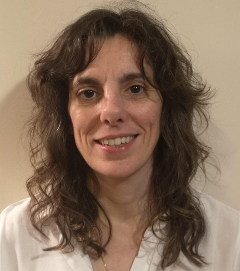
The Medical Officer represents a new position in the EBMT and embodies the evolution of the organisation towards professionalism. It is a significant role in developing professional education and standards, supporting the EBMT research strategy and in building fruitful relationships with other stakeholders designed to deliver safe quality care for patients and donors. Welcome Isabel!
Isabel Sánchez-Ortega, Medical Officer
 “I am a consultant hematologist interested and involved in HSCT since my specialty training at Hospital de la Santa Creu I Sant Pau in Barcelona. Following completion of my training in 2008, I became a consultant hematologist and HSCT physician at the Institut Català d’Oncologia (ICO) in Barcelona. Since then, I have been in charge of HSCT recipients, focusing on long-term complications and chronic GvHD, infectious complications, aplastic anaemia and donors.
“I am a consultant hematologist interested and involved in HSCT since my specialty training at Hospital de la Santa Creu I Sant Pau in Barcelona. Following completion of my training in 2008, I became a consultant hematologist and HSCT physician at the Institut Català d’Oncologia (ICO) in Barcelona. Since then, I have been in charge of HSCT recipients, focusing on long-term complications and chronic GvHD, infectious complications, aplastic anaemia and donors.
During the last 12 years I have been actively involved in the work of the EBMT in various ways. I have been directly involved in JACIE accreditations at ICO including roles of quality management, involved in the activities of several EBMT Working Parties including the LWP, the TCWP and the SAAWP, as an investigator, an author and a speaker and contributed as a coauthor to the recent edition of the EBMT Handbook.
Furthermore, I have been the PI of many trials in HSCT and also participated as a PI in EBMT academic trials, such as the successful RACE trial in aplastic anaemia.
Beyond my activities with EBMT, I participate in various committees and groups of the Spanish Transplant Group (GETH) and the EHA Scientific Working Group on Infections in Hematology.
On March 2020 I joined EBMT as a medical officer, position that stands on three main pillars: JACIE and benchmarking, education and e-learning and research, science and relationships with other stakeholders, all of them designed to save and improve the lives of patients with blood-related disorders.”